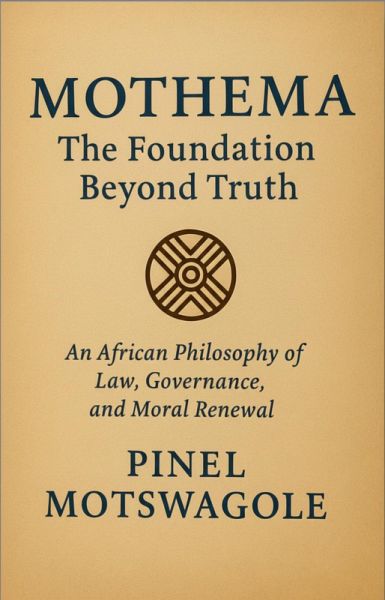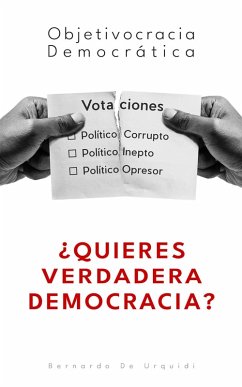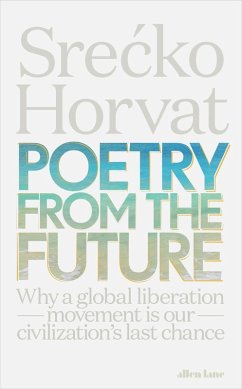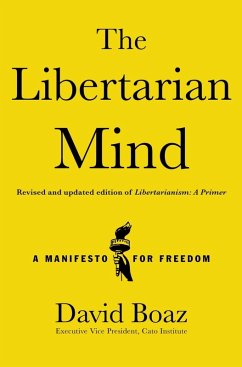
MOTHEMA: The Foundation Beyond Truth (1, #1) (eBook, ePUB)

PAYBACK Punkte
0 °P sammeln!
MOTHEMA: The Foundation Beyond Truth presents an African philosophy of governance rooted in moral balance. It unites desire, reason, and stewardship to rebuild law, education, and economy on ethical foundations. Challenging colonial systems, it offers a blueprint for justice, sustainability, and cultural renewal grounded in African wisdom.MOTHEMA: The Foundation Beyond Truth presents a rigorous framework for African philosophy, law, and moral renewal. It argues that the survival of any civilization depends not on truth alone but on foundation - the deep ethical structure that sustains coherenc...
MOTHEMA: The Foundation Beyond Truth presents an African philosophy of governance rooted in moral balance. It unites desire, reason, and stewardship to rebuild law, education, and economy on ethical foundations. Challenging colonial systems, it offers a blueprint for justice, sustainability, and cultural renewal grounded in African wisdom.
MOTHEMA: The Foundation Beyond Truth presents a rigorous framework for African philosophy, law, and moral renewal. It argues that the survival of any civilization depends not on truth alone but on foundation - the deep ethical structure that sustains coherence between law, culture, and governance. When that foundation is lost, societies drift into imitation and imbalance. When it is restored, justice, economy, and identity regain proportion.
Developed by Pinel Motswagole, MOTHEMA unites three universal principles - desire, reason, and stewardship - into a moral architecture that explains how individuals and nations can act with both freedom and responsibility. The book critiques the legacy of Roman-Dutch and British law that reshaped African societies under colonialism, exposing how imported legal systems displaced indigenous models of mediation, consensus, and moral accountability. It then reconstructs an African jurisprudence rooted in customary ethics, ancestral wisdom, and intergenerational stewardship.
Through twelve interlinked chapters, Motswagole explores governance, economics, environmental responsibility, and education as interdependent moral systems. The text revisits precolonial legal traditions, the Black Consciousness movement, and post-independence political thought, drawing inspiration from figures such as Julius Nyerere, Steve Biko, Patrice Lumumba, and Martin Luther King Jr. Each chapter extends the MOTHEMA triad into new fields - from leadership and ecological policy to cultural education and global ethics - demonstrating how proportionality and reciprocity can replace domination and excess.
MOTHEMA positions Africa not as a follower of Western paradigms but as a teacher of balance. It shows that harmony arises not from fear or power but from foundation - from the discipline of moral consciousness transmitted through culture. By restoring African law, philosophy, and education to their rightful place, the book outlines a model for a just and sustainable civilization.
Scholarly in tone yet accessible in language, MOTHEMA: The Foundation Beyond Truth bridges philosophy, political theory, and decolonial studies. It invites readers to reconsider the meaning of truth, freedom, and governance in an age of ethical crisis. For philosophers, educators, policymakers, and students of African thought, this book offers not nostalgia, but blueprint - a call to rebuild the moral foundation of humanity from the wisdom of the continent that first taught the world to live in balance.
MOTHEMA: The Foundation Beyond Truth presents a rigorous framework for African philosophy, law, and moral renewal. It argues that the survival of any civilization depends not on truth alone but on foundation - the deep ethical structure that sustains coherence between law, culture, and governance. When that foundation is lost, societies drift into imitation and imbalance. When it is restored, justice, economy, and identity regain proportion.
Developed by Pinel Motswagole, MOTHEMA unites three universal principles - desire, reason, and stewardship - into a moral architecture that explains how individuals and nations can act with both freedom and responsibility. The book critiques the legacy of Roman-Dutch and British law that reshaped African societies under colonialism, exposing how imported legal systems displaced indigenous models of mediation, consensus, and moral accountability. It then reconstructs an African jurisprudence rooted in customary ethics, ancestral wisdom, and intergenerational stewardship.
Through twelve interlinked chapters, Motswagole explores governance, economics, environmental responsibility, and education as interdependent moral systems. The text revisits precolonial legal traditions, the Black Consciousness movement, and post-independence political thought, drawing inspiration from figures such as Julius Nyerere, Steve Biko, Patrice Lumumba, and Martin Luther King Jr. Each chapter extends the MOTHEMA triad into new fields - from leadership and ecological policy to cultural education and global ethics - demonstrating how proportionality and reciprocity can replace domination and excess.
MOTHEMA positions Africa not as a follower of Western paradigms but as a teacher of balance. It shows that harmony arises not from fear or power but from foundation - from the discipline of moral consciousness transmitted through culture. By restoring African law, philosophy, and education to their rightful place, the book outlines a model for a just and sustainable civilization.
Scholarly in tone yet accessible in language, MOTHEMA: The Foundation Beyond Truth bridges philosophy, political theory, and decolonial studies. It invites readers to reconsider the meaning of truth, freedom, and governance in an age of ethical crisis. For philosophers, educators, policymakers, and students of African thought, this book offers not nostalgia, but blueprint - a call to rebuild the moral foundation of humanity from the wisdom of the continent that first taught the world to live in balance.
Dieser Download kann aus rechtlichen Gründen nur mit Rechnungsadresse in A, B, CY, CZ, D, DK, EW, E, FIN, F, GR, H, IRL, I, LT, L, LR, M, NL, PL, P, R, S, SLO, SK ausgeliefert werden.













